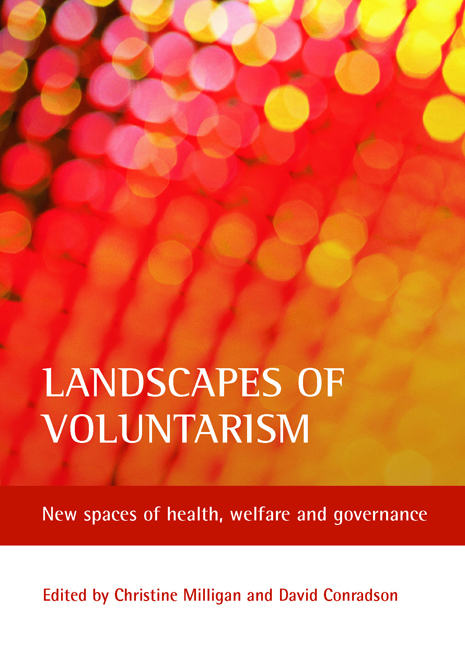Book contents
- Frontmatter
- Contents
- List of tables, figures, maps and plates
- Notes on contributors
- Foreword: Beyond the shadow state?
- one Contemporary landscapes of welfare: the ‘voluntary turn’?
- two A ‘new institutional fix’? The ‘community turn’ and the changing role of the voluntary sector
- three Renewal or relocation? Social welfare, voluntarism and the city
- four Voluntarism and new forms of governance in rural communities
- five New times, new relationships: mental health, primary care and public health in New Zealand
- six Informal and voluntary care in Canada: caught in the Act?
- seven Competition, adaptation and resistance: (re)forming health organisations in New Zealand’s third sector
- eight The difference of voluntarism: the place of voluntary sector care homes for older Jewish people in the United Kingdom
- nine Values, practices and strategic divestment: Christian social service organisations in New Zealand
- ten Faith-based organisations and welfare provision in Northern Ireland and North America: whose agenda?
- eleven Government restructuring and settlement agencies in Vancouver: bringing advocacy back in
- twelve Developing voluntary community spaces and Ethnicity in Sydney, Australia
- thirteen The voluntary spaces of charity shops: workplaces or domestic spaces?
- fourteen The changing landscape of voluntary sector counselling in Scotland
- fifteen Volunteering, geography and welfare: a multilevel investigation of geographical variations in voluntary action
- sixteen Reflections on landscapes of voluntarism
- Index
nine - Values, practices and strategic divestment: Christian social service organisations in New Zealand
Published online by Cambridge University Press: 15 January 2022
- Frontmatter
- Contents
- List of tables, figures, maps and plates
- Notes on contributors
- Foreword: Beyond the shadow state?
- one Contemporary landscapes of welfare: the ‘voluntary turn’?
- two A ‘new institutional fix’? The ‘community turn’ and the changing role of the voluntary sector
- three Renewal or relocation? Social welfare, voluntarism and the city
- four Voluntarism and new forms of governance in rural communities
- five New times, new relationships: mental health, primary care and public health in New Zealand
- six Informal and voluntary care in Canada: caught in the Act?
- seven Competition, adaptation and resistance: (re)forming health organisations in New Zealand’s third sector
- eight The difference of voluntarism: the place of voluntary sector care homes for older Jewish people in the United Kingdom
- nine Values, practices and strategic divestment: Christian social service organisations in New Zealand
- ten Faith-based organisations and welfare provision in Northern Ireland and North America: whose agenda?
- eleven Government restructuring and settlement agencies in Vancouver: bringing advocacy back in
- twelve Developing voluntary community spaces and Ethnicity in Sydney, Australia
- thirteen The voluntary spaces of charity shops: workplaces or domestic spaces?
- fourteen The changing landscape of voluntary sector counselling in Scotland
- fifteen Volunteering, geography and welfare: a multilevel investigation of geographical variations in voluntary action
- sixteen Reflections on landscapes of voluntarism
- Index
Summary
… there are now few corners of the voluntary sector still to be ‘drawn in’ to new social policy partnerships with governmental agencies. It was to be expected, then, that politicians would eventually turn their attention to the resources of voluntarily given time and money made available by people of faith to religious charities and religious-based charities and encourage their direction into governmentally approved policy initiatives. (Harris et al, 2003, p 96)
Since the 1990s, governments in the industrialised West have shown growing interest in faith-based organisations as welfare providers. In the US, this attention has been reflected in the formation of the White House Office of Faith-based and Community Initiatives in 2000, as well as the influential Charitable Choice legislation of 1996 (Berger, 2003; Bane et al, 2005)1. A similar interest in faithbased organisations has developed in the UK under New Labour (Blair, 2001; Blunkett, 2001), with specific efforts in the spheres of community development and urban regeneration for instance (Farnell et al, 2003; Lukka et al, 2003). In each country, these engagements with faith-based organisations can be read as part of ongoing neoliberal efforts to enrol non-state actors in the delivery of welfare (Peck, 2001).
Given the geography of these developments, it is unsurprising that empirical research on faith-based welfare provision to date has largely focused on the US and UK. Key themes in this literature have included:
• the extent to which faith-based welfare organisations might be considered distinctive in relation to their secular counterparts (for example, Cloke et al, 2005; Kearns et al, 2005);
• the potential of faith-based organisations for enhancing social capital and promoting community development (for example, Shaftesbury Society and DETR, 2000; Lukka et al, 2003);
• the role of faith as an impetus for volunteering and voluntarism (Cnaan et al, 1993; Lukka and Locke, 2003);
• the place of faith groups in urban regeneration (Lewis, 2002; Smith, 2002; Farnell et al, 2003).
• the variable dispositions of local and national governments regarding the funding of faith-based organisations (Ebaugh et al, 2005).
In terms of organisational forms, studies have examined both religious congregations (for example, Harris, 1995, 1998; Chaves, 1999; Cnaan, 1999) and independently incorporated faith-based organisations (for example, Harris et al, 2003; Kearns et al, 2005).
- Type
- Chapter
- Information
- Landscapes of VoluntarismNew Spaces of Health, Welfare and Governance, pp. 153 - 172Publisher: Bristol University PressPrint publication year: 2006



